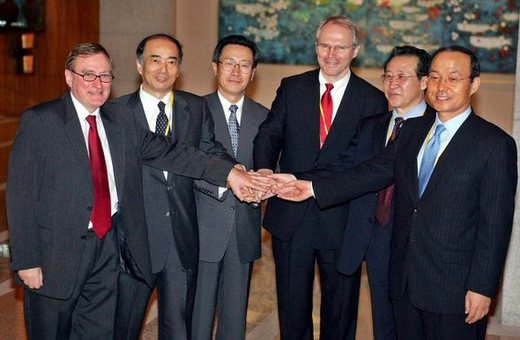 |
"We believe it will be either this coming month, November, (or) possibly December," Hill said. He added North Korea set no conditions for its decision. "They did not make any conditions," Hill said. "For us it was very important that no one should create conditions for attending the talks." Tuesday's agreement came after China's State Councilor Tang Jiaxuan, acting as a special envoy, visited Pyongyang and met with North Korean leader Kim Jong-il earlier this month. If the talks resume, they would mark the second session of the fifth round of the negotiations that began in August 2003. International efforts to restart the six-way talks have gained urgency since the communist regime tested a nuclear weapon on Oct. 9. The test prompted the United Nations Security Council to adopt a resolution imposing arms and financial sanctions on Pyongyang. Speaking at a forum last week in Washington, U.S. Secretary of State Condoleezza Rice said the U.S. will push for the implementation of the resolution even if the North rejoins the talks. South Korea welcomed North Korea's move. "The government welcomes the compromise on the resumption of the six-way talks made on the occasion of the three-way meeting between the United States, North Korea and China," the Foreign Ministry said in a statement issued by its spokesman. The government expects the talks to restart at an early date as agreed and pave the way for the denuclearization of the Korean Peninsula, the statement read. Asked when the talks are expected to reopen, South Korea's chief nuclear envoy Chun Yung-woo said, "It is more important for the participants to make progress when they gather again. They need to do their homework." North Korea has been staying away from the Beijing-based nuclear discussions since November last year. The North was supposed to hold discussions with its dialogue partners on how to implement the Sept. 19 joint statement in which it agreed to abandon its nuclear program in return for security guarantees and economic aid. But North Korean negotiators took issue with Washington's blacklisting of a Macau-based bank, Banco Delta Asia (BDA), which was suspected of laundering money for Pyongyang. North Korea had said it would continue to boycott the nuclear talks unless the U.S. lifts the restrictions. The U.S. had urged the North to come back to the table unconditionally. It remained uncertain whether the U.S. and North Korea reached a deal on the thorny BDA issue at Tuesday's meeting. A South Korean government official, asking not to be named, said the two sides seem to have made progress in resolving their financial disputes. "We need to get more information from China on the issue," he said. Seoul, Oct. 31 (Yonhap News)





